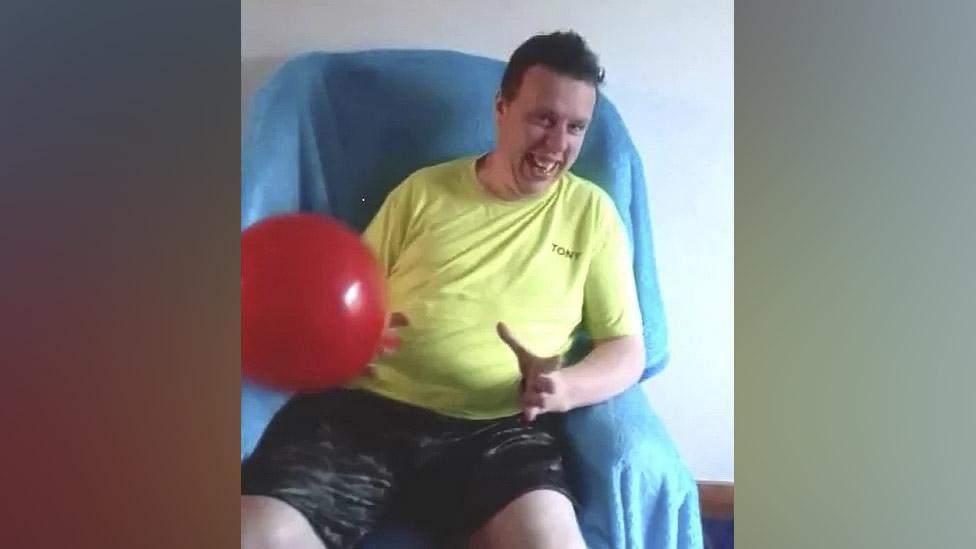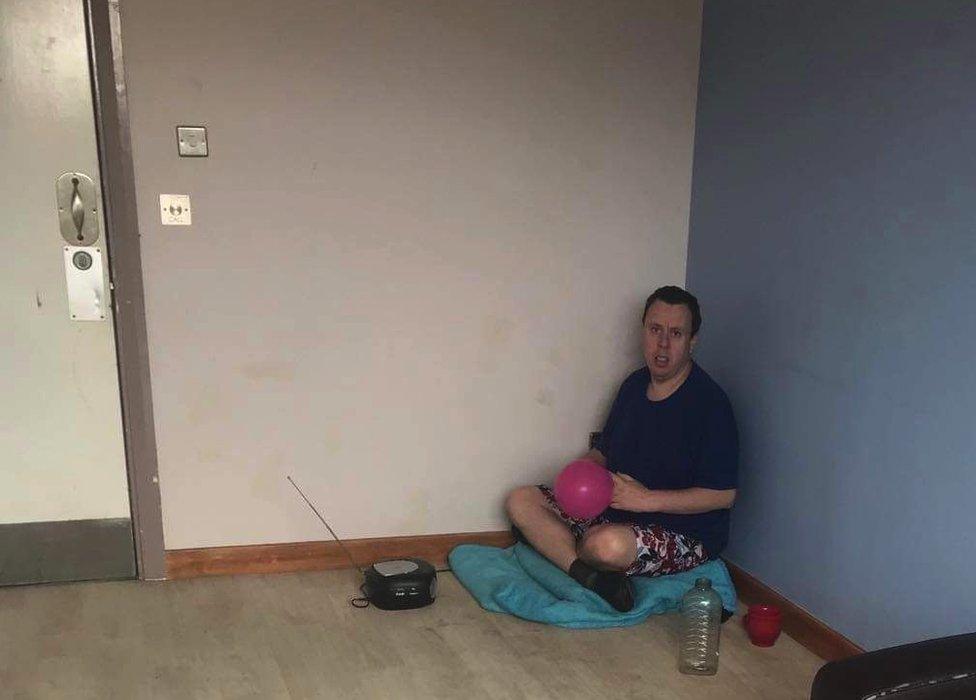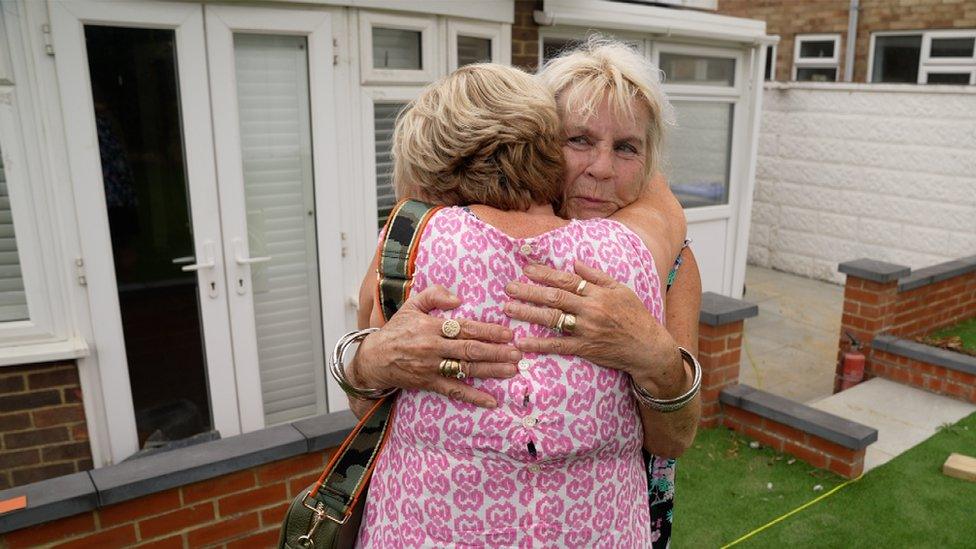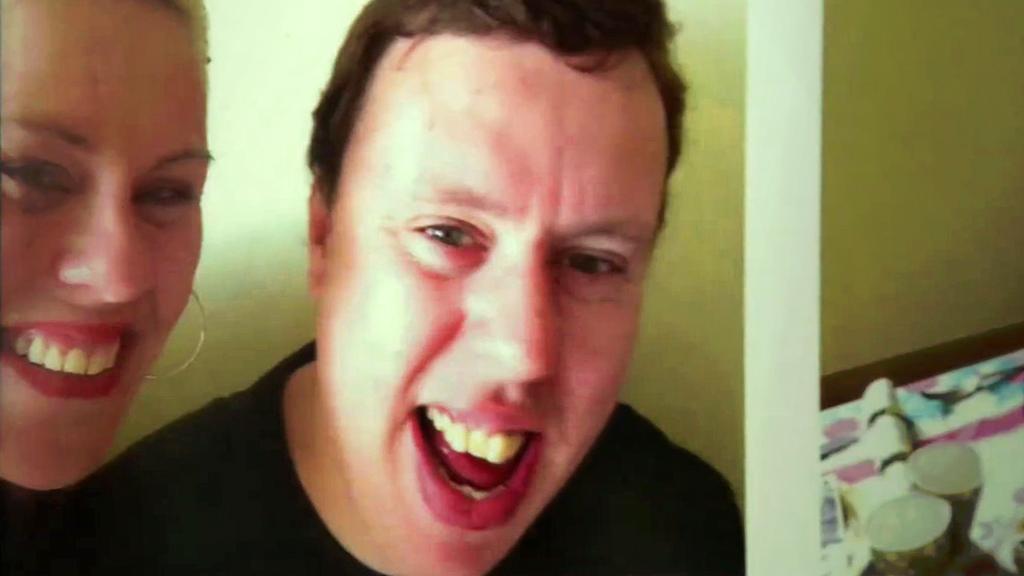Tony Hickmott: Autistic man to be released after 21 years in hospital
- Published

An autistic man who has been held in a secure hospital for 21 years has been told he can finally go home.
Tony Hickmott, 45, was sectioned after he had a mental health crisis in 2001, and despite a long fight by his family, he has not been released since.
Last year, a judge criticised his detention, telling authorities to find a home near his parents, in Brighton.
A care team for Mr Hickmott is now being assembled and he is expected in a new home in his home town, next month.
"He's coming home, I can't believe it," his mum Pam told BBC News. "It will be a real home. We'll get him home and every day will be a bonus."
Mr Hickmott has been held in a secure Assessment and Treatment Unit (ATU) designed to be a short-term safe space used in a crisis. It's a two-hour drive for his parents, Pam, 78 and Roy, 82.
There are about 2,000 people with learning disabilities or autism detained in specialist hospitals across England and a BBC investigation revealed 100 of them, including Mr Hickmott, have been held for longer than 20 years.
Last year, a select committee of MPs backed calls from campaigners to end the scandal of autistic people being wrongly detained, saying such hospitals should be closed by 2024.
In 2013, psychiatrists agreed Mr Hickmott was "fit for discharge" but authorities failed to create a care package with appropriate support in the community. Last December, Pam and Roy took the case to the Court of Protection.
There, a senior judge ordered managers at the NHS and Brighton & Hove City Council to stick to a rigorous timetable to find Mr Hickmott a home, condemning their "egregious" delays and "glacial" progress.
A whistleblower who worked at the ATU as a support worker between 2015 and 2017 also told the BBC Mr Hickmott was the "loneliest man in the hospital", living in segregation with little or no stimulation.
Mr Hickmott has to speak to staff through a hatch, the paint worn thin from countless knocks and bangs.
A photo taken on his birthday shows his TV encased in a Perspex box, his cards lined up on top. Mr Hickmott isn't allowed to use the remote control and has to ask carers to change channel.

Patients such as Tony Hickmott were stuck on a ward and left to watch TV all day, health inspectors said
This year, the Care Quality Commission (CQC) said Mr Hickmott's hospital - which we are not naming for his care and wellbeing - was failing to meet people's needs.
Inspectors halted further admissions because they believed "people would or may be exposed to significant risk of harm".
The report highlighted staff shortages, a lack of training and an increase in restrictive interventions. It reported how relatives of patients said their loved ones were heavily medicated and had few meaningful activities to enjoy.
Robert Persey, Brighton & Hove Council's executive director for health and adult social care admitted there had been unacceptable delays in Mr Hickmott's case - but said the process was both complicated and costly. Care in the community must be funded by the local authority.
"It has taken far too long. It's complicated trying to get all the elements like housing and carers all ready at the right time," he said.
"Local government [funding] is continually being cut. Yet we have a responsibility to look after these people to the optimum level we can, and the funding is really challenging to find and achieve that."
The hospital's owners have been approached for comment.

Family advocate Jayne Knight helped the Hickmott family for eight years
In June, the government published draft reforms to the Mental Health Act to redefine "mental disorder" so that it no longer included autism.
If enacted, the changes will also require authorities and the NHS to provide sufficient resources to prevent autistic people reaching crisis point and then having to stay in an institution because there is nowhere else to go.
A government spokesman told the BBC: "Ministers accept that there must be credible alternatives to inpatient facilities, allowing people to live independent and fulfilled lives in their community."
Broken promises
Chris Lucas, who is part of the care team supporting Mr Hickmott, has been meeting him each week for the last few months.
He said he loves talking about old TV game shows, singing the theme tunes. "I think his world is quite small at the moment. But now, I think there's so much opportunity for him. I think there's a whole world out there that can really help him become the person he is meant to be."
Mr Hickmott is expected to move into his new home on 1 November, but Pam and Roy remain fearful of further delays. "We can't give him any more broken promises. He says 'no more Christmases here, mum. No more birthdays here'. I've lost count of the broken promises. We can't do it to him again."
But they are looking forward to seeing their son living freely again - with support - in a bungalow close to where they live. "I can't wait for him to make us a cup of tea," Pam added.
"He wants to go to the pub with me," said Roy. "I'll have a pint and he'll have a half and he says he'll have a cheese roll. That's what he wants, a cheese roll. I can't wait. It'll be heaven."
- Published21 December 2021

- Published24 November 2021
